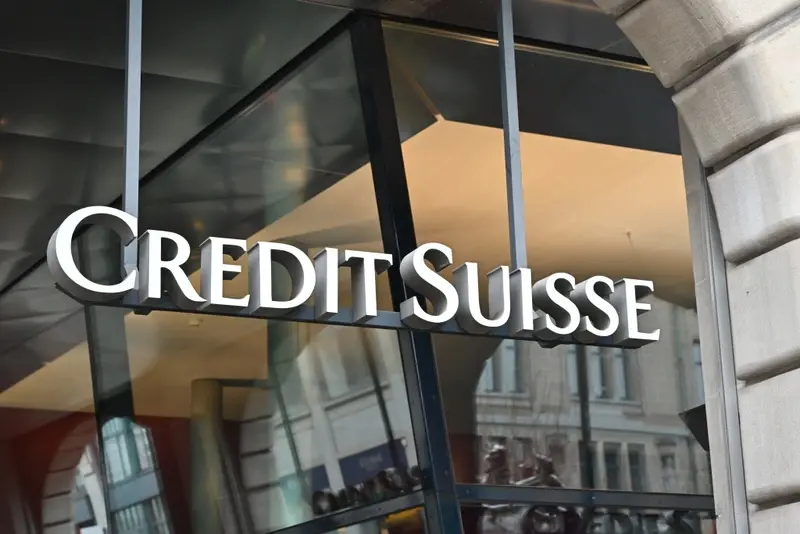
Bank shares were back under severe selling pressure on Wednesday, with some suspended from trading, after yet more bad news for Credit Suisse reawakened worries caused by the collapse of Silicon Valley Bank.
Just a handful of FTSE 100 stocks were in the green around midday UK time, all largely ’safe’ utilities or pharmaceutical firms.
While stocks made a tepid start to the day, they managed to hang on to most of Tuesday’s gains in early morning trade. That all changed heading into the afternoon, as stock markets went all jittery, not helped by more dismal news for troubled Credit Suisse.
Among London-listed small-caps, meanwhile, there were a number of M&A moves grabbing investor attention.
The FTSE 100 index dropped 186.87 points, 2.5%, to 7,450.24 midday Wednesday. The FTSE 250 was down 451.18 points, 2.4%, at 18,678.48, and the AIM All-Share was down 12.18 points, 1.5%, at 815.51.
The Cboe UK 100 slumped 2.2% to 746.40. The Cboe UK 250 dropped 2.4% to 16,310.95. The Cboe Small Companies lost 0.5% at 13,616.89.
In mainland Europe, the CAC 40 in Paris plunged 3.4%, while the DAX 40 in Frankfurt was 2.7% lower.
In Zurich, Credit Suisse tumbled 20%, before trading of the shares were suspended. Shares in the bank hit a historic low after its main shareholder said it would not provide the lender with more financial assistance.
‘The answer is absolutely not, for many reasons outside the simplest reason which is regulatory and statutory,’ Saudi National Bank Chair Ammar Al Khudairy said in an interview with Bloomberg TV.
Credit Suisse’s market value already had fallen this week over fears of contagion from the collapse of two US banks and its annual report citing ‘material weaknesses’ in internal controls.
Credit Suisse credit default swaps, essentially the cost of insuring its bonds in case of a default, skyrocketed to concerning territory, Bloomberg reported.
Bloomberg reported on Wednesday that some traders saw prices for one-year swaps at around 1,000 basis points on Tuesday, levels akin to Greek banks during the banking crisis there. Such a level is rare and is eighteen times higher than swaps for Swiss peer UBS and nine-times higher than Deutsche Bank, according to Bloomberg.
UBS shares were 6.8% lower in Zurich, while in Frankfurt, Deutsche shed 7.8%. Banking shares elsewhere across Europe followed Credit Suisse lower. Barclays lost 7.4% in London, while in Paris, Societe Generale and BNP Paribas lost around 10%, before trading of their shares also were suspended.
‘The financial sector in Europe is under significant turmoil today as a result of the SVB’s fallout. It was pretty much given that European banks were going to face issues as well, and today, Credit Suisse is in focus. There are a number of concerns here; firstly, traders are worried if Credit Suisse will be able to survive given that its stock has fallen below the two-handle level today, and if it doesn’t, how big the crisis is going to be,’ Zaye Capital Markets analyst Naeem Aslam commented.
Credit Suisse shares were last quoted at fr.1.78. A year ago they were priced at fr.6.75 and five years ago at fr.16.50.
Oil prices also suffered, reflecting concerns about demand. A barrel of Brent traded at $76.17 on Wednesday afternoon, down from $79.36 at the London equities close on Tuesday. The US crude benchmark, West Texas Intermediate, fell below $70 a barrel for the first time in 15 months.
Safe-haven gold rose, however. An ounce of the precious metal climbed to $1,910.70 early Wednesday afternoon from $1,903.01 late Tuesday.
The yen also benefited from the flight to safety. The dollar faded to JP¥133.64 on Wednesday afternoon from JP¥134.45 late Tuesday.
The euro traded at $1.0603 around midday London time, down from $1.0719 late Tuesday and some way off an intraday high of $1.0760.
Amid all the European banking sector turmoil, numbers from Sweden and France also served as a reminder that inflation pressure is proving tough to shake off.
Swedish inflation defied the central bank’s mitigating rate hikes, and unexpectedly spiked to 12% in February, AFP reported. Facing a drop in the value of its currency, the krona, the Nordic country is now experiencing one of the highest inflation rates in Europe, and the highest outside of Eastern Europe.
Meanwhile, final consumer price index figures for France on Wednesday revealed prices accelerated even faster than initially thought in February.
According to Insee, in February 2023, consumer prices rose by 6.3% year-on-year, compared to growth of 6.0% in the previous month. This topped the flash estimate of 6.2%.
Ahead of the UK budget announcement, the pound fell to $1.2069 at midday, from $1.2150 at the London equities close on Tuesday.
A major expansion of free childcare and an extension in support for household energy costs will help ease the cost of living as UK Chancellor Jeremy Hunt sets out a ‘budget for growth’.
The chancellor confirmed that the energy price guarantee, which caps average household bills at £2,500, will be extended at its current level from April to June. It had been due to rise to £3,000 in April and the cost of scrapping the planned 20% increase will amount to around £3 billion.
Back on the London Stock Exchange, Prudential dropped 10%. The insurer reported mixed yearly results.
It said annual premium equivalents - a measure of the new policies sold - rose 4.7% to $4.39 billion from $4.19 billion in 2021. Gross premiums earned, however, fell 3.6% to $23.34 billion from $24.22 billion. Hurting its bottom-line, meanwhile, was a $30.16 billion investment loss, swinging from a return of $3.49 billion in 2021.
Pretax profit halved to $1.48 billion from $3.02 billion. European embedded value operating profit, however, increased 12% to €3.95 billion. The latter figure is based on longer-term investment returns and ignores short-term fluctuations.
Elsewhere in London, Hyve Group added 12%. The events organiser agreed to a £320 million takeover from investor Providence Equity Partners. The bid values each Hyve share at 108p, a 41% premium to its 77p stock price the day before it received an approach from Providence back in February.
The takeover offer gives Hyve an equity value of £320 million and an enterprise value of £481 million. Providence made an approach back in February, pitching a bid of 105p per share.
Hyve said the bid announced on Wednesday has the support of around 17% of shareholders.
There was also M&A-related news at online estate agent Purplebricks, oil and gas company Reabold and advertising technology firm Tremor.
Up-for-sale Purplebricks confirmed it has been in talks with fellow online estate agent Strike over its potential participation in a formal sale process. Purplebricks said Strike ‘is not participating in the formal sale process’ as yet.
Purplebricks shares traded 11% higher.
Reabold rose 9.5%. It received a takeover proposal from a Kamran Sattar on behalf of Portillion SPV O&G, which it believes to be an affiliate of Portillion Capital, a financial advisory firm. Sattar is chief executive of Portillion Capital.
Reabold said the proposal came through e-mail and offered little other details besides an offer price which is a 10% premium to company’s 0.18p closing price on Tuesday.
This would imply a bid price of 0.2035p per share, Reabold said, valuing the company at £18.7 million.
Reabold added: ‘Even in the absence of further information, the board believes that the possible offer price significantly undervalues Reabold’s investment portfolio, the company as a whole, and its future prospects. Shareholders are advised to take no action in respect of the possible offer at this stage.’
Finally, Tremor lost 11%. It said it is not currently in a sale process, though it confirmed it is in discussions with Goldman Sachs as an ongoing financial adviser.
‘From time to time, the company receives inquiries, and the board evaluates such inquiries, as applicable, together with its financial advisor. The board continues to believe in the stand-alone prospects of the business, and also recognizes its fiduciary duties to its shareholders,’ Tremor said.
On Tuesday, Sky News reported Tremor received a number of enquiries from possible bidders.
US equities were called to open sharply lower. The Dow Jones Industrial Average and S&P 500 were pointed down 1.7%, and the Nasdaq Composite down 1.4%.
Still to come on Wednesday’s economic calendar is a US producer price index reading at 1230 GMT. The data comes ahead of the next Fed policy-setting meeting next week.
‘Fed expectations have downshifted because of the SVB failure,’ commented Brown Brothers Harriman. ‘We couldn‘??t disagree more. We do not think SVB impacts Fed policy whatsoever; while financial stability is the Fed’??s unofficial third mandate, we do not believe SVB meets that criterion.’
BBH said Wednesday’s US consumer price index, which showed annual inflation of 6.00% in February, underscored the need for further tightening of US monetary policy.
Copyright 2023 Alliance News Ltd. All Rights Reserved.





